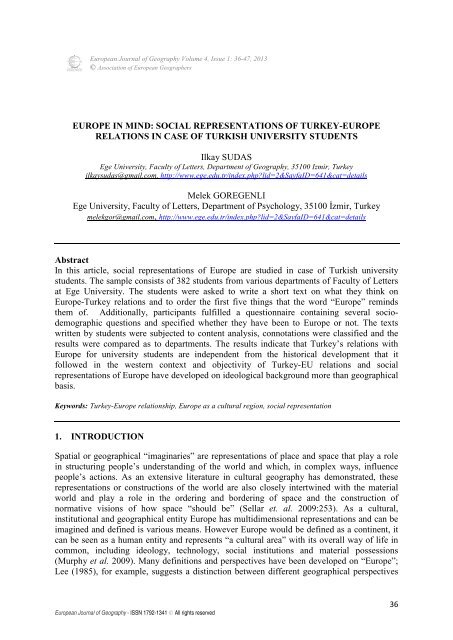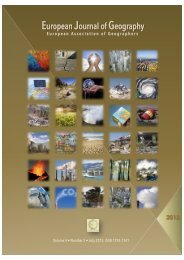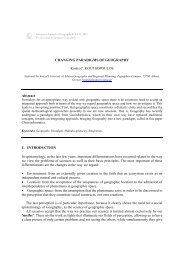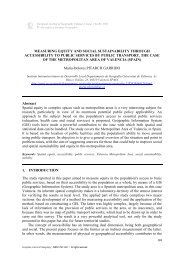European Journal of Geography
European Journal of Geography
European Journal of Geography
You also want an ePaper? Increase the reach of your titles
YUMPU automatically turns print PDFs into web optimized ePapers that Google loves.
<strong>European</strong> <strong>Journal</strong> <strong>of</strong> <strong>Geography</strong> Volume 4, Issue 1: 36-47, 2013<br />
© Association <strong>of</strong> <strong>European</strong> Geographers<br />
EUROPE IN MIND: SOCIAL REPRESENTATIONS OF TURKEY-EUROPE<br />
RELATIONS IN CASE OF TURKISH UNIVERSITY STUDENTS<br />
Ilkay SUDAS<br />
Ege University, Faculty <strong>of</strong> Letters, Department <strong>of</strong> <strong>Geography</strong>, 35100 Izmir, Turkey<br />
ilkaysudas@gmail.com, http://www.ege.edu.tr/index.php?lid=2&SayfaID=641&cat=details<br />
Melek GOREGENLI<br />
Ege University, Faculty <strong>of</strong> Letters, Department <strong>of</strong> Psychology, 35100 İzmir, Turkey<br />
melekgor@gmail.com, http://www.ege.edu.tr/index.php?lid=2&SayfaID=641&cat=details<br />
Abstract<br />
In this article, social representations <strong>of</strong> Europe are studied in case <strong>of</strong> Turkish university<br />
students. The sample consists <strong>of</strong> 382 students from various departments <strong>of</strong> Faculty <strong>of</strong> Letters<br />
at Ege University. The students were asked to write a short text on what they think on<br />
Europe-Turkey relations and to order the first five things that the word “Europe” reminds<br />
them <strong>of</strong>. Additionally, participants fulfilled a questionnaire containing several sociodemographic<br />
questions and specified whether they have been to Europe or not. The texts<br />
written by students were subjected to content analysis, connotations were classified and the<br />
results were compared as to departments. The results indicate that Turkey’s relations with<br />
Europe for university students are independent from the historical development that it<br />
followed in the western context and objectivity <strong>of</strong> Turkey-EU relations and social<br />
representations <strong>of</strong> Europe have developed on ideological background more than geographical<br />
basis.<br />
Keywords: Turkey-Europe relationship, Europe as a cultural region, social representation<br />
1. INTRODUCTION<br />
Spatial or geographical “imaginaries” are representations <strong>of</strong> place and space that play a role<br />
in structuring people’s understanding <strong>of</strong> the world and which, in complex ways, influence<br />
people’s actions. As an extensive literature in cultural geography has demonstrated, these<br />
representations or constructions <strong>of</strong> the world are also closely intertwined with the material<br />
world and play a role in the ordering and bordering <strong>of</strong> space and the construction <strong>of</strong><br />
normative visions <strong>of</strong> how space “should be” (Sellar et. al. 2009:253). As a cultural,<br />
institutional and geographical entity Europe has multidimensional representations and can be<br />
imagined and defined is various means. However Europe would be defined as a continent, it<br />
can be seen as a human entity and represents “a cultural area” with its overall way <strong>of</strong> life in<br />
common, including ideology, technology, social institutions and material possessions<br />
(Murphy et al. 2009). Many definitions and perspectives have been developed on “Europe”;<br />
Lee (1985), for example, suggests a distinction between different geographical perspectives<br />
<strong>European</strong> <strong>Journal</strong> <strong>of</strong> <strong>Geography</strong> - ISSN 1792-1341 © All rights reserved<br />
36






